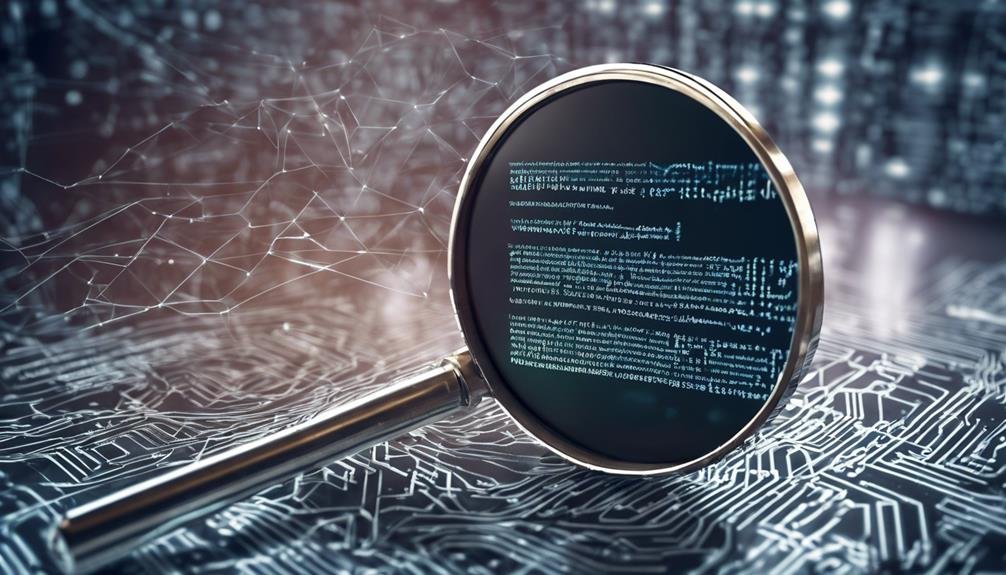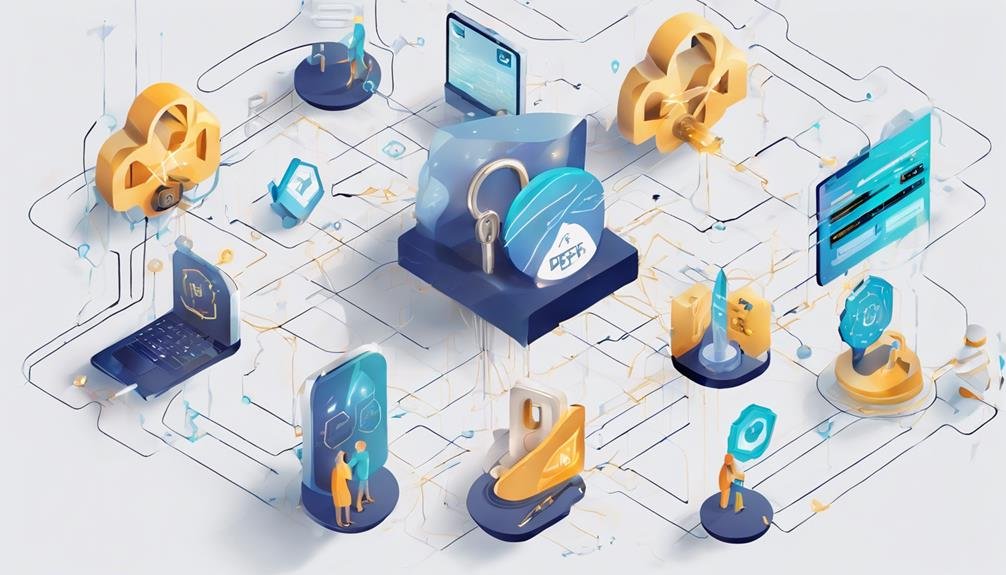Table of Contents
Brief Overview of 5 Best Practices for Smart Contracts Security In Decentralized Finance
- Implement input validation and SafeMath for secure coding.
- Conduct regular code audits and rigorous testing.
- Utilize formal verification tools for enhanced security.
- Exercise caution with upgradeability features.
- Secure Oracle usage through diversification and monitoring.
To guarantee secure smart contracts in DeFi, you must:
- Integrate input validation, employ SafeMath packages, establish access control, prioritize simplicity, and follow safe coding practices.
- Carry out regular audits, conduct thorough testing, maintain transparency, provide post-audit support, and use isolated testnets.
- Use formal verification tools to demonstrate correctness, reduce vulnerabilities, and build trust mathematically.
- Be cautious with upgradeability, assess impacts, test mechanisms, control access, and balance risks.
- Mitigate Oracle risks by diversifying sources, leveraging decentralized solutions, monitoring continuously, implementing reviews, and choosing reputable providers.
Implementing these best practices is essential for a secure DeFi experience.
Coding Techniques for Secure Smart Contracts
To guarantee the security of your smart contracts, utilize coding techniques such as input validation and error handling. Security is paramount when it comes to DeFi and smart contract applications. By incorporating secure coding tools like SafeMath packages and implementing access control measures, you can create a robust defense against vulnerabilities.
Secure smart contract design involves embracing simplicity to reduce the attack surface. Safe coding practices prevent common vulnerabilities like integer overflow and underflow. Regularly audit your smart contracts to identify and fix security issues before they can be exploited. Following these best practices ensures your smart contracts are secure and resilient to potential threats. Remember, the foundation of secure smart contracts lies in the meticulous application of safe coding practices and secure design principles.
Regular Audits and Security Checks

Regular audits by reputable firms are essential in identifying vulnerabilities and ensuring the security of smart contracts in DeFi. When it comes to securing your smart contracts, here’s what you need to do:
- Comprehensive Code Reviews: Thoroughly examining the codebase helps spot potential weaknesses that malicious actors could exploit.
- Rigorous Testing: Testing every smart contract aspect under various conditions is vital to guarantee its resilience to different attack vectors.
- Transparent Communication: Maintaining open and clear communication channels during audits fosters collaboration and allows for a better understanding of the security measures taken.
- Continuous Support: Post-audit support is crucial for promptly addressing uncovered vulnerabilities and implementing recommended security enhancements.
Regular audits on isolated testnets are a proactive measure to mitigate risks before deploying smart contracts on the mainnet. By consistently following these practices, you can uphold the integrity and security of your DeFi smart contracts.
Formal Verification Tools Utilization

Utilize formal verification tools to enhance the security and reliability of your DeFi smart contracts. Formal verification involves mathematically proving the correctness of smart contracts by analyzing the code to guarantee it meets specified properties and constraints. By employing these security tools, you can reduce the risk of code vulnerabilities and errors in smart contract execution, ultimately strengthening the overall security of your decentralized finance (DeFi) applications.
Incorporating formal verification into your development process is a proactive approach that allows you to establish a solid foundation for secure smart contracts. These tools enable developers to rigorously verify the behavior of their code and identify potential weaknesses before deployment. By adhering to security best practices and leveraging formal verification tools, you can instill trust in the integrity of your smart contracts, fostering a more secure DeFi ecosystem. Use these advanced techniques to fortify your smart contracts and mitigate potential security threats effectively.
Caution With Upgradeability Features

Exercise caution when implementing upgradeability features in your smart contracts to mitigate potential security risks.
- Evaluate Functionality Impact: Consider how upgradeability could impact the contract’s functionality and security, ensuring it aligns with your project’s goals.
- Ensure Testing and Auditing: Make sure that any upgradeability mechanisms are well-tested and audited by reputable firms to identify and address potential vulnerabilities.
- Implement Access Control: Utilize access control measures to restrict unauthorized upgrades, maintaining control over changes to the smart contract.
- Balance Benefits and Risks: Aim to balance the benefits of upgradeability, such as flexibility and adaptability, with the risks involved regarding security and contract integrity.
Oracle Security and Risk Mitigation

Diversifying data sources for oracles enhances security by reducing the risk of manipulation and single points of failure. When securing smart contracts, leveraging decentralized Oracle solutions to mitigate risks effectively is imperative. Monitoring Oracle networks and price feeds is essential to promptly identifying vulnerabilities. Implementing mechanisms for peer review and regular audits can further enhance the security of Oracle data.
Decentralized Oracle solutions offer a robust defense against centralized vulnerabilities, ensuring the integrity of the data used in smart contracts. By choosing reputable Oracle providers with a proven track record of reliability, you can bolster the security of your smart contract ecosystem. Stay vigilant and monitor Oracle activity closely to detect any anomalies or suspicious behavior, as early detection is critical to preventing potential security breaches. Remember, proactive measures such as diversification and monitoring play a crucial role in safeguarding DeFi protocols when it comes to Oracle security considerations.
Frequently Asked Questions
How Can I Make My Smart Contract More Secure?
To make your smart contract more secure, guarantee code review, external audits, gas optimization, error handling, access control, input validation, secure libraries, emergency shutdown, contract upgrades, and secure data storage. Follow best practices for thorough protection.
What Are the Considerations for Smart Contract Security?
Always prioritize code reviews, penetration testing, and security audits to keep your smart contract secure. Utilize bug bounties, automated analysis, and secure coding practices. Implement continuous monitoring, vulnerability management, and timely security patches for a robust defense.
What Is Defi Smart Contract Security?
To guarantee DeFi smart contract security, you must prioritize code review, vulnerability assessment, security audits, penetration testing, secure coding, threat modeling, risk assessment, continuous monitoring, and bug bounty programs. Embracing security best practices is essential.
What Is the Most Secure Smart Contract Blockchain?
Ethereum stands out as the most secure smart contract blockchain for DeFi. With its solidity programming language and extensive developer community, audited contracts on Ethereum offer proven reliability. Other options like Tezos also provide secure environments.
Conclusion
In the fast-paced world of DeFi, ensuring the security of smart contracts is paramount. You can mitigate risks by implementing coding techniques, regular audits, formal verification tools, and caution with upgradeability features. However, don’t forget about Oracle security – a potential weak link in the chain. Remember, in the world of DeFi, the only thing more unpredictable than the market is the potential for vulnerabilities in smart contracts. Stay vigilant, stay secure.




